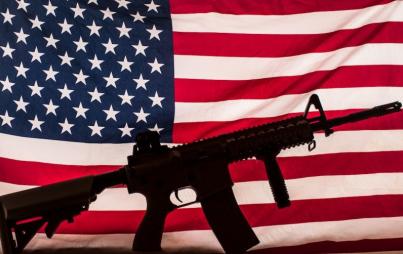
To be an average gun owner, to me, is to harbor an unhealthy amount of suspicion that has much in common with the unhealthy suspicions that fuel domestic terrorists and confused youngsters stoked by Confederate historians, racist talk show hosts, televangelists. . .
“There is no other advanced nation on Earth that tolerates multiple shootings on a regular basis and considers it normal, and to some degree that’s what’s happened in this country, it’s become something that we expect.”- Barack Obama speaking on Marc Maron’s WTF podcast, June 19, 2015.
As Marc Maron observed in his interview with the president, there are millions of Americans who run the country from their couch, himself included. The comedian’s words had strange resonance before a man who, through two terms, has managed to grow publicly more somber with each successive incident of gun crime in the country. He’s effectively run a presidency that has become symbolized as much in its later years by national mourning as it was in its early years by hope and aspiration. Across racial lines, many of the people who hoped and aspired with him have been gunned down. These killings have occurred increasingly within the United States by its citizens.
The United States is a place with binary opinions. In that spirit of drastic over-simplification there are two wars being carried out on in the United States in 2015, a war on foreign terrorism and a war on American citizens carried out amongst themselves. The war on foreign terrorism is the one that we know from the press. This is the one that entertains. The author George Orwell alluded to a unique characteristic of foreign wars that they are never ending. They neatly fit a 24-hour news cycle based on correspondence from journalists and personalities placed in exotic foreign locales such as Donetsk or Syria. There is a sense of adventure and entertainment married to foreign war and foreign correspondence.
To say that a similar sense of chaos and random death is within the homeland is a much harder sell. However in 2015, there is a remedy to that sales pitch. It is ISIS. ISIS is stealing away impressionable children. The implication of this storyline of ongoing recruitment is that there is a seemingly endless stable of impressionable U.S. youth prepared to take up arms overseas. If foreign war and terrorism correspondence were somehow magically placed on a media blacklist after a short period of time, I believe there would immediately be a laser focus on the people I find more concerning than ISIS, average folks I never suspected would enjoy shooting ranges or would own a gun to uphold tradition.
It is worth recalling that during the presidency of George W. Bush, the term “low-level threat” or “low-level terrorism” were bandied about freely. These threats or terrors always came from abroad. Guns were exported to protect US soil. In this scenario, gun manufacturers and ammunitions suppliers always sell more guns. This has become a normal political pill for both parties to swallow because combating low-level threats and engaging in foreign wars lies upon the conceit, through a long thread of logic, that the family life of millions is in danger and is worthy of extreme protective measures.
Where protection fails, harm begins. There’s an enormous amount of harm that can be committed by taking up arms. This is the chief reason that most advanced countries restrict gun ownership to the armed forces or military. The average citizen should not have access to a firearm. Though I feel that this article is less about the man than the phenomenon he invokes, I have to mention Dylann Roof. Roof was 21 — barely post-adolescent. Most adolescents are confused, but live within the normal confines of teen rage — traveling in skateboard caravans or smashing bottles at the local handball court. I’d argue that as being an acceptable level of roguery or ennui. When adolescents, or adults living within an adolescent headspace are armed with guns (John Holmes, Columbine shooters Harris and Klebold, or Dylann Roof) and not affiliated with law enforcement or the US armed forces, then a real problem emerges and enormous harm is done. Folks will spin Roof’s age into a Clockwork Orange-esque cautionary tale. That is to miss the point entirely. It is not that difficult to see how Roof would have worn an older man’s clothes. I believe that the spirit of Roof in an alternate path, his views softened with age and compartmentalized within family life, would have found sympathy amongst colleagues in the U.S. Senate or Congress.
Private gun ownership in the States has failed to protect, largely due to a perfect paradox of social disconnect and obsessive social resolutions within those who choose to use them to settle accounts. Historically, the firearm or any weapon capable of carrying out murder holds a sacred place. Perhaps the Natives wiped out in the occupation of North and South American were the most keenly aware of this. To treat a gun as anything less than sacred, to have access to them in a place where you can buy crayons or pet food, is to remove them from the sacred. They become products.
After 20 school children were shot in Newtown, Connecticut by a 20-year-old kid they had never met, Obama noted that “sales" shot up. Ammunition shot up and each time that these events occur, ironically, gun manufacturers make out like bandits.” To gun and weapons manufacturers, there is no irony, only sales. The conversations after the killings were revealing. There was no shortage of public discourse proposing the idea that providing more guns at public schools would avert future mass killings.
Buying a product that protects one by symbolically alternating between implied menace and a direct death threat towards an “adversary” does not come with an owner’s manual labeled morality. Some would argue that a gun is a tool. Everyone uses a tool differently. A gun is not a tool. It is a psychological stimulus no different from receiving too much sun in your eyes, or chewing too many coca leaves in a Colombian guerilla stronghold. People have devised measures and codes to rein in these behaviors. These codes are lacking in gun ownership. In many ways they have never been properly established. When thinking about prevention ideologies, I typically defer to Sun Tzu’s The Art of War. It more or less spells out that the essential tenant in waging war is to minimize casualty at all cost. This idea has never passed muster in the States because, for gun owners, that logically intimates an eventual surrender of ownership of their weapon.
Proposals for gun control laws usually get a knee-jerk reaction out of gun owners. For some, the spectre of black helicopters coming to get their guns is somewhere in the fine print of these legislations. This, of course, is speaking to the fantasy of the most zealous gun owners. Yet whenever I have met anyone who was not a far-right-winger or who hinted at gun ownership, I always reach two distinct thoughts: the first that they likely do not understand what gun possession means, because they have not participated in the solemnity of its repercussions and learned from it in a meaningful way. The second is that they will never be convinced that policing themselves is a bad idea, even if they are reminded that everyone pays taxes to fund the existing police force.
To be an average gun owner, to me, is to harbor an unhealthy amount of suspicion that has much in common with the unhealthy suspicions that fuel domestic terrorists and confused youngsters stoked by Confederate historians, racist talk show hosts, televangelists, men in gated communities, or Charlton Heston — men who believe in tradition with a capital “T.”
I don’t have respect for tradition when it implies becoming a clone of a forefather. To my knowledge and experience, every generation before myself harbored some ultimate wrong or deficiency of behavior that is usually only ceded too late — in old age whilst on the hospital death bed, or in the grave. The average citizen does not live in the times of the Revolutionary War, Civil War, or the decades of the Great Wars. Ours is a time of law, not war, and tradition is pernicious because it will always try to argue the reverse.







